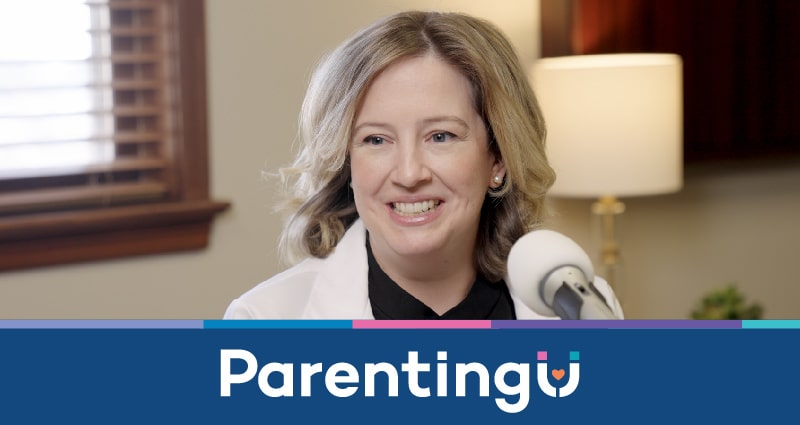Embarking on the journey of puberty with your daughter can be daunting, but armed with knowledge and support, you can guide her through this significant transition with confidence and compassion.
In this podcast episode of ParentingU, Karli M. Boggs, MD, Board Certified gynecologist with Our Lady of the Lake Physician Group, joins us to explore what parents can expect and how they can support their daughters through puberty.
Signs of Puberty: What to Expect
Puberty impacts various aspects of a girl’s physiology and psychology. “It’s a long-term process that affects essentially every system in the body,” Dr. Boggs says.
The first sign of puberty onset is usually breast bud development, which happens around age 8 to 9. The first menstrual cycle starts around two years after that on average.
Other physical changes include hair development in areas like the underarms and pubic region, alterations in body shape and growth spurts.
Moody Tween Girl? Understand Her Brain’s Role
Puberty isn’t just about changes in girls’ bodies. Alongside these physical developments, girls experience shifts in their mood and emotions.
“The brain is rapidly developing and changing during puberty, and that’s where some of the moodiness and the emotions going up and down really start to show up,” Dr. Boggs says.
The amygdala – a region in the brain associated with emotional regulation and decision-making – is developing and changing during adolescence.
“Children are also gaining independence and trying to be separate from their parents,” Dr. Boggs says. “Navigating that change is difficult for adolescents as well as their parents.”
Start the Conversation – and Keep It Going
Parents play a pivotal role in guiding our daughters through the maze of puberty. There’s no one-size-fits-all, surefire answer to when start the conversation about puberty with your daughter. Gauge her maturity level and readiness for discussion, then set the stage for open communication.
“Around 7 or 8, start the conversation in very basic terms,” Dr. Boggs says. “What I really recommend is to be curious and let your child be curious. Have them ask questions and feel comfortable with you being the trusted adult they can go to with their concerns.”
The conversation should not be simply “The Talk” given once, but Dr. Boggs recommends prioritizing ongoing communication with your daughter about puberty and the changes she can expect and experiences in her body.
“None of this happens overnight,” Dr. Boggs says. “It’s not a light switch. It’s a process, and it takes years.” Let the topics arise naturally – acne, first period, changes in body height – and approach the conversations with confidence and compassion.
Having these conversations with girls and boys can make puberty easier on everyone, reducing discomfort and normalizing the changes tweens and teens are experiencing.
Also in this ParentingU episode we chat with Brett Hutchinson, MD, Board Certified pediatrician with Our Lady of the Lake Children’s Health, about what boys experience during puberty, including growing pains that impact both genders. Read more from Dr. Hutchinson.
Preparing Parents for the Talk
But what about parents who find these conversations uncomfortable or embarrassing? Dr. Boggs advises preparation and research. Resources such as healthychildren.org from the American Academy of Pediatrics and girlshealth.gov from the U.S. Department of Health & Human Services offer reliable information tailored to various stages of development.
Sharing personal experiences can validate the journey for both parent and child.
“We need to share our experiences with our children so that they know they’re not alone,” Dr. Boggs says. By normalizing these discussions, parents can alleviate the anxiety surrounding puberty.
First Periods
Addressing the topic of menstruation can be particularly daunting for both parents and daughters. Talking about it in advance and helping girls know what to expect can prepare them for this natural occurrence.
“Be proactive, not reactive,” Dr. Boggs says. “Really let them know it’s nothing bad. It’s nothing scary. It’s nothing dangerous or abnormal.”
Girls may sometimes be very embarrassed by the onset of menstruation, and you know your daughter best. If she’d prefer to tell you when she needs period supplies in writing, set that up in advance.
When should parents think about bringing their daughter in for her first GYN visit?
The American College of Obstetricians and Gynecologists recommends that first evaluation around ages 13 to 15. Such an appointment doesn’t require an exam but is more of a conversation.
It’s an opportunity to introduce young girls to the world of gynecology, fostering trust and providing a knowledgeable adult resource for future questions and concerns.
Red Flags and Concerns
Worry is a constant in parenting, and puberty is no exception. Worries about puberty and its onset – whether too early or too late – can be eased by connecting with healthcare professionals.
“If you start to notice breast development of having a period before age 8, that is not normal and needs to be evaluated by a pediatrician and endocrinologist,” Dr. Boggs says. “If by 15 there’s no breast development or no menstruation, the girl needs to be evaluated by a pediatrician.”
Many things can cause either of these extremes outside the normal puberty curve, and starting with your pediatrician is your best first step with any worries about your children’s development.
Painful periods are not normal and are another reason to seek professional help. Start with your pediatrician.
Our Lady of the Lake Children’s Health offers an adolescent gynecology clinic that provides a much-needed resource for girls ages 14 to 18. The clinic offers a safe space for girls to address pelvic pain, menstrual irregularities and other gynecological concerns, with a focus on patient comfort and whole person care.
Puberty Conversations on Social Media
The evolving landscape of how teens get their information and share with each other, using social media and other apps on their phones, presents positives and negatives for girls and their families when it comes to puberty and first periods.
“The conversation has become much more open,” Dr. Boggs says. “It’s part of the mainstream now, which is wonderful because it removes the fear and shame associated with puberty and menstruation.”
Unfortunately, those same social media channels can also perpetuate myths and set unrealistic expectations.
A silver lining: apps for tracking menstrual cycles can help girls spot problems sooner, better understand their bodies and seek medical guidance promptly.
Dispelling Myths and Providing Support
In debunking misconceptions about puberty, Dr. Boggs underscores the importance of listening to girls and affirming their diverse experiences. Every girl’s journey is unique. She highlights the need to address society’s tendency to downplay menstrual pain. She encourages parents and girls to seek healthcare intervention when needed.
By fostering open communication and providing accessible resources, parents can empower girls to navigate the ups and downs of puberty with confidence and resilience.




